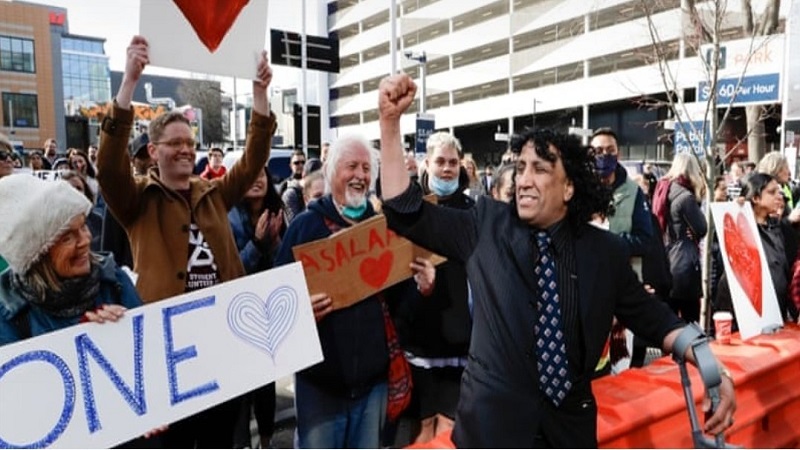Emotions were intensified in New Zealand today as a life sentence was handed down to 29-year-old terrorist Brenton Tarrant – who massacred 51 musallees at the Al Noor and Linwood Masajid in Christchurch during Jumuah prayers on 15 March 2019. In a landmark ruling, Judge Cameron Mander said the white supremacist would be given a life sentence without the possibility of parole on Thursday – the first of its kind in New Zealand’s history.
Tarrant had opened fire with semi-automatic weapons in a live-streamed rampage that went viral and led to the implementation of more stringent firearm policies and greater social media protocols. New Zealand Prime Minister Jacinda Ardern characterised the killings a well-planned “terrorist attack” on one of the country’s “darkest days”.
Global condemnation and the unified grief from the international Muslim community led to the brazen act being labelled as terrorism – a moment of irony for the Australian, who revealed after his arrest that his motive was to avenge “thousands of deaths caused by foreign invaders”.
In June, he was charged with 51 murders, 41 attempted murders and one charge of terrorism.
In delivering the sentence, Mander said that a finite term was insufficient for such a crime and that Tarrant had shown no remorse.
Speaking to VOC on Thursday, Imam Abdul Lateef from the Linwood Mosque in Christchurch said it was an emotional week for family and friends, as dozens came face to face with Tarrant while they delivered victim impact statements in court.
Those affected spared no details as they described their devastation at the loss of their loved ones and the trauma his actions put them through. While many vowed never to forgive Tarrant, others thanked him for bringing them closer to Islam and granting the deceased the status of martyrs.
“When they got everything together (evidence and testimonies) you could see there was no way out for him. The Judge also said, that spending the rest of his life behind bars is not enough for the crime he has committed,” he said.
“The victims were extremely emotional. I felt so sorry, especially for the widows and the children who were orphaned, the brothers and sisters who were rendered (debilitated) for the rest of their lives because they’re unable to walk.”
“Apart from that, when the impact is done already, you get to know how much the victim is important in the family,” he added.
Lateef said that some survivors still spoke of the fear of sudden and loud noises, that the “fear is still there”. He added, however, that attacking a masjid now would be difficult as the sacred space is protected by police. Racism, religious intolerance and xenophobia are also met with a heavy hand by government authorities.
He further explained that the unity seen during the international outrage held true throughout the trial and religious tolerance increased instead of decreased, as was hoped by Tarrant. He added how the masajid has been showered with donations and frequented by other faiths such as Christianity, who want to find out more about the life of a Muslim.
“You can’t tell the difference within the religious groups. Muslims, Christian, Hindu, Jewish- everybody came together because it had to do with a place of worship and ethnicity. The thoughts of these kinds of people (Tarrant) is beyond what we can comprehend.”
“One of the (testimonies) by a brother whose father was killed, he said: ‘This world is threaded in colours and a person like you (Tarrant) could never change the colour of a nation. He tried to divide us, but he failed miserably, and we will remain united.”
The massacre is considered a turning point in New Zealand history and highlighted the threat of far-right extremism and Islamophobia. The shock of the massacre came at a time when western democracies are being reshaped in line with the image of xenophobic and white supremacist populism.
South African ex-pat Achmat Esau said the past year has been hard, but it was a transformative process to learn from.
“Today culminated in the sentencing and there were tears of joy in the country. All we could say is Allahu Akbar (God is Great). Today is unprecedented in New Zealand’s history.”
Esau who lives in Auckland, says the New Zealand government is supportive of ethnic communities and has taken a number of measures to promote inclusion and religious harmony. Esau is a member of a Maori Muslim group in Auckland called Matou Reo (Our Collective Voice), which has branches in all the main centres in NZ. Members are mostly Maori and Pacific Island reverts to Islam.
“Overnight, Islam and Muslims have been elevated and here we are quite comfortable in declaring ourselves as Muslims. As a group, we are making massive strides and we hope the Muslim community here can be an example to the world where Muslims can play a prominent role in Western Society.”
LISTEN:
VOC






 WhatsApp us
WhatsApp us 

